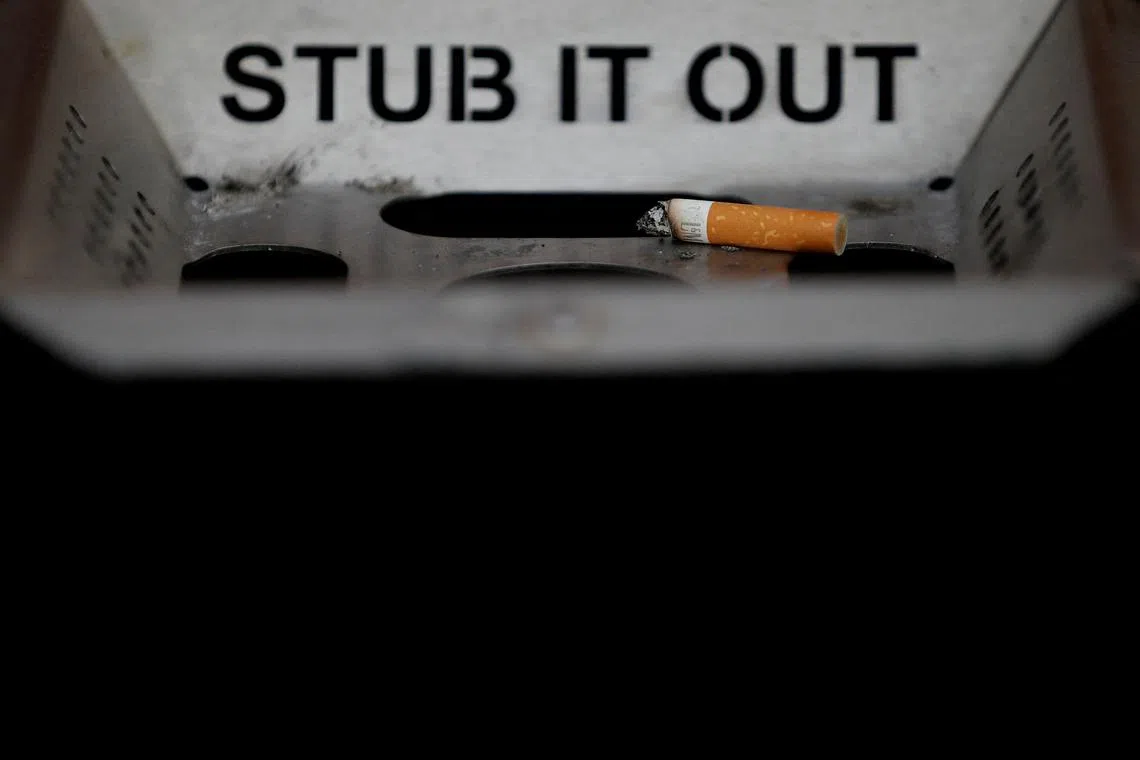New Zealand to scrap historic smoking ban to fund tax cuts
Sign up now: Get ST's newsletters delivered to your inbox

The ban, under New Zealand's Smokefree laws, had sought to prevent people born after January 2009 from smoking.
PHOTO: REUTERS
Follow topic:
New Zealand’s new coalition government is scrapping a historic law that was meant to prevent future generations from smoking
Prime Minister Christopher Luxon confirmed the move on Nov 27, soon after being sworn in as the country’s next leader
The planned repeal had been reported by New Zealand media on Nov 24.
The newly installed government had said it was a bid to fund tax cuts.
Health advocates were quick to criticise the decision.
The ban, under the Smokefree Environments and Regulated Products Act, was introduced in 2022 by the previous Labour-led government.
It would have made it illegal for people born after January 2009 to ever buy cigarettes.
The legislation was also meant to restrict the sale of smoked tobacco products to a limited number of approved retail establishments, the Tobacco Reporter said.
New Zealand was believed to be the first country in the world to implement such a ban on smoking, and similar measures have been considered in several countries, including Britain.
New Zealand’s law was to be implemented from July 2024, The Guardian newspaper said.
But on Nov 25, New Zealand’s new Finance Minister Nicola Willis said that the measures would be axed before March 2024.
The revenue from cigarette sales would go towards the coalition’s tax cuts, she said.
As a countermeasure, the new government said it would increase penalties for illegal sales of cigarettes to those under 18, the New Zealand Herald reported.
Under the Smokefree laws, the sale of tobacco to anyone born on or after Jan 1, 2009, was to be punishable by fines of up to NZ$150,000 (S$122,000). It was not clear what the new penalties would be.
The government added that it would ban disposable e-cigarettes.
In an interview with Radio New Zealand, Mr Luxon said his government is committed to reducing tobacco use.
He said the reversal of the Smokefree laws would prevent an underground tobacco market from developing, and stop shops that sell cigarettes from being targeted for crime.
“Concentrating the distribution of cigarettes in one store in one small town is going to be a massive magnet for crime,” Mr Luxon told the radio station.
Health Coalition Aotearoa, a group of 45 member organisations and 75 individuals, said it was extremely disappointed by the new government’s move.
Health Coalition Aotearoa’s co-chair, Professor Lisa Te Morenga, said in a media release from the group that the repeal will cost thousands of lives.
It will have the greatest impact on New Zealand’s Maori population, she said, as they have the highest rates of smoking in the country, at 19 per cent.
New Zealand’s former health minister Ayesha Verrall said in a post on X, the former Twitter: “Repealing smoke-free laws will mean thousands of deaths and billions of health costs.
“Way to start being health minister – by caving in to the tobacco industry.”
Ms Verrall was referring to her successor, Mr Shane Reti.
Estimates showed that the Smokefree regulations would have saved the country NZ$1.3 billion in healthcare costs over the next 20 years if fully implemented, Health Coalition Aotearoa said.
The regulations would have also reduced mortality rates by 22 per cent for women and 9 per cent for men, the group added.
Health Coalition Aotearoa also said that tobacco, alcohol and unhealthy food cause nearly one-third of preventable health loss in New Zealand.
Data released in late 2022 showed that New Zealand’s smoking rate fell to 8 per cent of adults smoking daily in the year through July 2022, down from 9.4 per cent a year earlier, according to a Bloomberg report.
The previous Labour-led government had envisioned a future where the country would be completely smoke-free.

